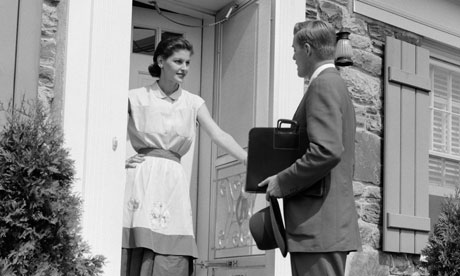
I remember them well: those heavy black books with their glossy gold lettering, all 32 of them, occupying their own special bookcase in the corner of my grandparents' living room. Anything I wanted to know – the circumference of the globe, say, or the migratory habits of Canada geese – my grandfather would look for in there, his prized set of Encyclopedia Britannica.
But such a memory will, from now on, remain just that. On Tuesday, Jorge Cauz, president of the Chicago-based Encyclopedia Britannica, Inc, announced that, 244 years since it was first compiled and printed in Edinburgh, the encyclopedia will no longer be produced in book form. "Some people will feel sad about it and nostalgic about it," Cauz said. "But we have a better tool now. The website is continuously updated, it's much more expansive and it has multimedia."
Expansive it may be, but the Britannica website is not, as the encyclopedia sets once were, flogged door to door by enterprising salesmen – and they were almost always men – with a neat line in charming householders into parting with a large amount of cash for books that they would in many cases never read. According to a 2006 report by Northwestern University's Kellogg School of Management, Britannica's own market research showed that the typical encyclopedia owner opened the books just once or twice a year.
Though they were occasionally sighted on Britain's suburban streets until the 1990s, the largest fleet of Britannica salesmen was in the US, where the encyclopedia was first marketed in the 1790s; the company's headquarters moved there in the 1920s. Ten years later, around 2,000 salesmen were selling the Britannica door to door, on a commission of between $500 and $600 per sale. JG Ballard did it, between working as a florist's porter and turning to writing; Mike Myers's father, Eric, did it; and so did Woody Harrelson's dad, Charles – before becoming a contract killer.
The depiction of encyclopedia salesmen in film and literature is rarely flattering, and often funny: in a Monty Python sketch from 1969, a suspicious housewife allows a burglar to enter her flat to rob her on the condition that he doesn't try to sell her an encyclopedia (once he's allowed in, of course, he does just that). In another skit from a 1976 episode of the US comedy The Carol Burnett Show, Dick Van Dyke appears as Smiley Rogers, an encyclopedia salesman who unwittingly interrupts a marital argument and is thrown across the room by the irate husband.
Encyclopedia salesmen have also popped up in Sesame Street, and in John Updike's novel The Beauty of the Lilies, in which a priest, the Reverend Clarence Wilmot, loses his faith and ends up selling encyclopedias. And in a 1997 episode of Friends, where – in a knowing riff on the fact that many households ended up with only a few editions, rather than the whole set – Joey buys just the "V" volume; $50 sounds like a bargain to him, when the full complement is $1,200. Smooth-pattered encyclopedia salesmen of the world: we mourn your passing.

